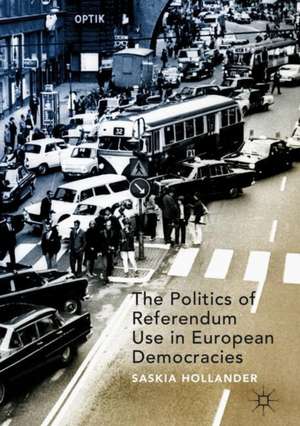The Politics of Referendum Use in European Democracies
Autor Saskia Hollanderen Limba Engleză Hardback – 12 apr 2019
Preț: 589.97 lei
Preț vechi: 694.09 lei
-15% Nou
Puncte Express: 885
Preț estimativ în valută:
112.89€ • 118.18$ • 93.41£
112.89€ • 118.18$ • 93.41£
Carte tipărită la comandă
Livrare economică 07-21 aprilie
Preluare comenzi: 021 569.72.76
Specificații
ISBN-13: 9783030041960
ISBN-10: 3030041964
Pagini: 249
Ilustrații: XVII, 345 p. 30 illus.
Dimensiuni: 148 x 210 mm
Greutate: 0.59 kg
Ediția:1st ed. 2019
Editura: Springer International Publishing
Colecția Palgrave Macmillan
Locul publicării:Cham, Switzerland
ISBN-10: 3030041964
Pagini: 249
Ilustrații: XVII, 345 p. 30 illus.
Dimensiuni: 148 x 210 mm
Greutate: 0.59 kg
Ediția:1st ed. 2019
Editura: Springer International Publishing
Colecția Palgrave Macmillan
Locul publicării:Cham, Switzerland
Cuprins
1 Introduction: The Politics of Referendum Use in Europe.- 2 Referendums and Democratic Theory.- 3 Referendums and Institutional Theory.- 4 Referendum Provisions and Use in 28 Countries.- 5 Referendum Practice in France.- 6 Referendum Practice in Denmark.- 7 Referendum Practice in the United Kingdom.- 8 Referendum Practice in Sweden.- 9 Referendum Practice in the Netherlands.- 10 Conclusions: The Drivers of Referendum Use in Europe.
Notă biografică
Saskia Hollander is a political scientist and Director of Knowledge Management at The Broker, a knowledge brokering organisation in the field of inclusive politics and economies, based in The Hague, The Netherlands. Her previous publications include the edited book Creative Crises of Democracy (with J. Gijsenbergh, T. Houwen and W. de Jong, 2012).
Textul de pe ultima copertă
This book demonstrates that the generally assumed dichotomy between referendums and representative democracy does not do justice to the great diversity of referendum types and of how referendums are used in European democracies. Although in all referendums citizens vote directly on issues rather than letting their political representatives do this for them, some referendums are more direct than others. Rather than reflecting the direct power of the People, most referendums in EU countries are held by, and serve the interests of, the political elites, most notably the executive. The book shows that these interests rarely match the justifications given in the public debate. Instead of being driven by the need to compensate for the deficiency of political parties, decision-makers use referendums primarily to protect the position of their party. In unravelling the strategic role played by national referendums in decision-making, this book makes an unconventional contribution to the debateon the impact of referendums on democracy.
Saskia Hollander is a political scientist and Director of Knowledge Management at The Broker, a knowledge brokering organisation in the field of inclusive politics and economies, based in The Hague, The Netherlands. Her previous publications include the edited book Creative Crises of Democracy (with J. Gijsenbergh, T. Houwen and W. de Jong, 2012).
Caracteristici
Provides a cross-country comparison of referendum provisions and their frequency in 28 European countries Uniquely links referendum practices to democratic theory Argues that referendums are instruments for political elites rather than the people
